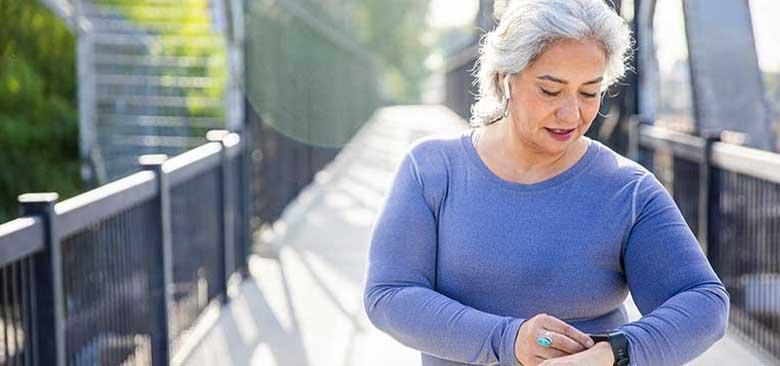
The mobile health app marketplace has grown to more than 300,000 apps. UCSF School of Nursing associate professor Linda Park discusses how mobile health apps can be used effectively. (Photo credit: iStock)
Can That Mobile App Really Improve Your Health?
Mobile apps have the potential to improve patients’ health but knowing which app to choose and how to correctly interpret the vast amounts of data they provide can be challenging.
UCSF School of Nursing associate professor Linda Park has been studying the effectiveness of mobile health strategies for nearly a decade. In this Q&A, Park discusses her mobile health research, how these apps can be used effectively and what the future may hold for mobile health technology.
What are some ways mobile health apps/technology can improve patient health?
I have used text messaging and mobile apps in randomized clinical trials to improve medication adherence and physical activity in patients with cardiovascular disease. In one study of 90 participants with coronary heart disease, I found that participants who received text message-reminders were more likely to take the correct doses of their antiplatelet medication at the scheduled times.
One key to success with text messaging is personalizing messages whenever possible and giving timely feedback on their behaviors. Our study found high satisfaction among participants receiving personalized text messages and close to 90 percent strongly or moderately agreed that the text messaging feature on their mobile phone was easy to use.
With mobile apps, patients have enjoyed being able to track their behaviors and seeing their progress over time. Generally, there can be a fine balance with engagement and reminder/message fatigue, so it is important to ask patients about their preferences on frequency of messages through text messaging or push messages that come through the app.
Is there a certain type of digital technology that works best with medication adherence (text message, mobile app, website)? Why?
We are currently exploring that through a randomized clinical trial with six national sites including Veterans Affairs (VA) and non-VA sites that has been extended until September 2022. In this mixed-methods study, we’ve used focus groups to help us identify the content of the text messages that was most acceptable to participants and the mobile app (Medisafe) to use in our clinical trial.
Your Mobile4Heart study found that using a Fitbit and mobile app were more effective than a pedometer/paper diary for physical activity after cardiac rehab. How encouraging are these results considering the average age of the study’s participants was 66 — a group often not thought of as experienced with digital technologies?
From my experience with older adults, most are very excited to use digital devices or apps to support their health. Many older adults manage multiple chronic diseases and appreciate reminders or supportive tools that promote self-management. That was evident in the Mobile4Heart study where participants who used the mobile app and Fitbit took about 2,100 more steps per day than the control group.
In my focus groups, some participants said they didn’t like depending on others to remind them about taking their medication so text messaging or a mobile app appealed to them. Everyone has different reasons, but it was uncommon to find older adults who are completely unwilling to give digital technologies a chance.
There are certainly many benefits using mobile health apps. Are there any negatives?
It is often frustrating for those who may not be tech-savvy to troubleshoot an app when it is not functioning as it should. As with anything, you never want a patient to have one bad experience with a health-related mobile app and then give up on apps altogether.
There are more than 318,000 mobile health apps. How can individuals and health care providers make the right choice?
There will always be pros and cons with each app but some things like data security should always be an important consideration. Sometimes it’s a matter of preference from patients who use the apps (user-friendly, features, design) or providers who want an easy interface to see patients’ summarized data. Affordability, usability, and privacy issues should also be considered.
Does more data necessarily equal improved health?
My belief is that more data is helpful only if/when one has figured out how to interpret the data to improve relevant outcomes such as clinical status and health care delivery. It takes a multidisciplinary team to figure out how to best collect, apply and interpret the data we receive. This takes the work of researchers who understand behavioral science (and not just the technology), data scientists, engineers and others.
What’s the next evolution in mobile health apps? Is it building on prescription digital therapeutics? Or do you see other advances in the future?
The idea of prescription digital therapeutics still has a long way to go but may be more successful in closed health care systems like the VA or Kaiser. For example, the VA has a library of mobile apps that providers are encouraged to “prescribe” to veterans for mental health, smoking cessation, weight loss, etc. Other exciting advances on the horizon may include leveraging mobile health technology to advance precision health. This might look like researchers collecting biomarkers such as blood samples or other measures to determine if technology-based interventions are helpful for certain individuals or groups. Creating this “digital biomarker” can then be used to explain, influence and/or predict patient outcomes.





